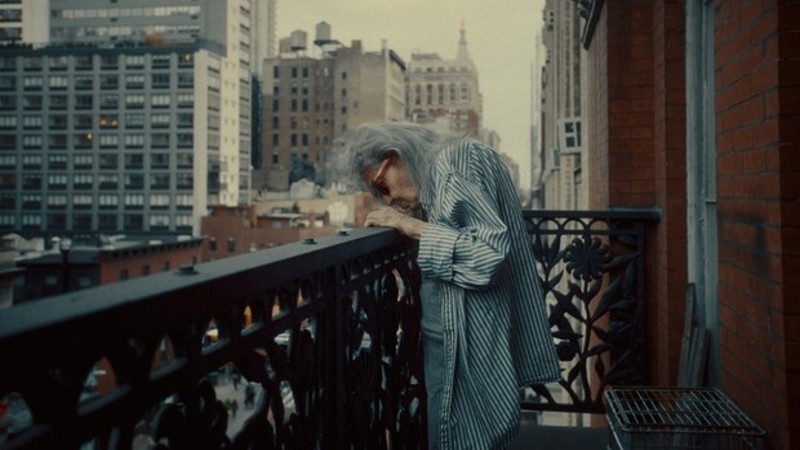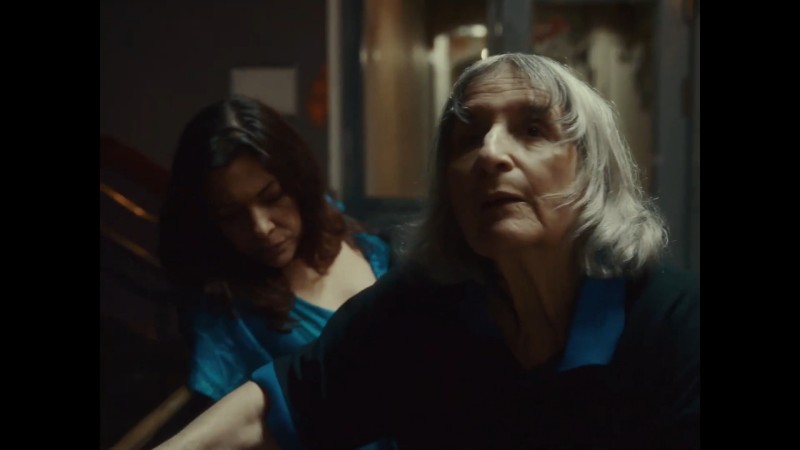




Belgian directing duo Maya Duverdier and Amílie Van Elmbt don’t believe in ghosts, but they do believe in the “spirit” of a place. Their documentary Dreaming Walls: Inside the Chelsea Hotel (2022) carries us between the present and the past of a landmark of New York’s counter-culture scenes. Once a shelter for the queer and eccentric – with such icons as Dylan Tomas, Jack Kerouac and Mark Twain who lived there – the Chelsea is now a luxury hotel offering rooms for up to £1,000 a night.
The first-time directors capture a pivotal moment during the gruelling renovation of this edifice, which serves as a symbol for the ravages of gentrification. In the documentary, archival footage is projected onto the interior walls like the haunting presence of the Chelsea’s distant memories. Past and present converge in the lives of the residents, some of whom moved to the hotel in the ’80s. Resisting the owners’ efforts to eject them, the residents are the remaining lanterns of the Chelsea’s vibrant history – a time when artists could create freely in New York, unburdened by financial insecurity. Dreaming Walls: Inside the Chelsea Hotel is an ode to the Chelsea and to those sitting in the shadows of the bigger names.
During a videoconferencing conversation (pictured above) with DMovies‘s writer Gaelle Biguenet, Maya Duverdier and Amílie Van Elmbt discuss the challenges they faced during the production of the documentary.
Dreaming Walls is in cinemas on Friday, January 20th.
…
.
Gaelle Biguenet – Could you take me through your journey to becoming filmmakers?
Maya Duverdier – I come from the art field. I did an art school in France, Les Beaux-Arts de Paris, for three years, where I learnt to use cameras with a measure of freedom. Soon I developed a love for documentary filmmaking and I started to film people. I went on to do a master’s in cinema [at the Ecole Cantonale d’Art de Lausanne] but because it was in an art school I still enjoyed a kind of freedom. We learnt a little bit of technique but the emphasis was much more on what we want to express. I didn’t learn cinema very strictly. After graduating, I worked as an assistant on various projects to earn a living until I made Dreaming Walls, which is my first long feature film.
Amílie van Elmbt – I’ve always wanted to tell stories but as a kid I had difficulties with grammar, now we call that dyslexia. When I realised that there was a possibility to use the language of images to produce stories, I was super excited. I remember asking my father to rent a camera for my eighth birthday so that I could direct my friends. In the footage, you can see me scream, “cut!” That was my first experience [with directing] and it was very playful, and I love the playful aspect of filmmaking. When I was a teenager I discovered that there were film schools in Belgium where I could learn to make films. I got accepted in IAD [Institut des Arts de Diffusion], where I studied, but it wasn’t a super nice experience for me.
In cinema schools back at the time, I’m talking 15 years ago, you had to follow a certain programme laid out by teachers who were mostly men. They never asked us ‘why did you make this?’ or ‘why did you tell this story?’ which to me are the most important questions. I wanted to experiment with a 15 minute’ shot, which wasn’t in fashion at the time. Since my projects were always rejected, I didn’t graduate.
I went to Paris because I was very fond of the French New Wave cinema. I was super inspired by Jean-Luc Godard, François Truffaut and Jacque Rivette – their musical sense of language in the mise-en-scène, which was really important for the movement of camera. But like Maya I needed to make money so I went back to Belgium and worked in television as a director. When I turned 25, I wondered if it wasn’t time to make a film. I was afraid of becoming like my colleagues, who were getting older and still had not made a film. I don’t know, I had this idea in mind that 25 would be the year when I make something, so I started writing a story. It grew into a long feature film and, because I couldn’t find a producer, I did everything myself. Looking back, I think it was also a challenge for me to see if I was able to make a long feature film or if it was just a childhood dream of being a director. I made Head First and it happened to be screened in the Cannes Film Festival in a special section called ACID, which is for Indie films selected by a group of directors.

GB – Is this how you got into contact with Martin Scorsese? How did he come to produce Dreaming Walls?
AvE – Because of Cannes, the film travelled to North America and New York. I won a prize of directing [at the New York First Time Festival], where Scorsese and other famous people from the cinema industry were present. Since he’s the godfather of the festival, I gave Scorsese my film. Three or four months later I received a letter in which he said that there is a lot of quality in my film, [adding]: ‘If you have something else you want to show or do, let me know.’ I needed several months to process that this was real. I was really scared of responding because it far exceeded my expectations.
That’s why I asked him to be a part of my second feature film, [The Elephant & the Butterfly; van Elmbt, 2017]. It was a tough production and we had a lot of trouble with money. But he didn’t want to participate in the production of Dreaming Walls because he was not enthusiastic about producing a documentary. He did, however, help us with digitalising archives from the residents and he’s like a godfather to me because I knew he would see the film and give us his opinion on it. It was really important to know what he thinks since it is set in New York and centres around a landmark that he probably visited at some point in his life.
Actually Scorsese enjoyed the film so much that he said to us: people need to see this film. What do you need to promote it? We asked him to put his credit as an Executive Producer because we knew it would help. So his contribution came later on and was more of a stamp than executive producer work.
GB – How much freedom did you feel in the production of the documentary?
AvE – It’s always very tricky because if you want your film to be seen, you have to make sacrifices. As Scorsese always said to me, you have to be strategic. But the most difficult part for me was the relationship with the production company based in Belgium. It involved many complicated negotiations on choices that would cost money. But we had expectations and ambitions for the film’s aesthetic. So there was always a fight, which was not fun. We lost a lot of time fighting instead of making progress. But it’s part of learning and knowing that for the next film, the person I embark on this adventure with will be the right one and will understand my ideas. It’s really a question of trust between the production company and the author because when you make a documentary, you never know exactly what’s going to happen.
MD – I would add that it’s much more difficult when the production company is not with us because they can’t feel what we are living.
GB – What were some of the ideas that you were clashing on?
AvE – TV Player wanted to have a famous narrator like Ethan Hawke and they wanted us to categorise the film: Is it a historical or pop culture film? We didn’t want those categories. So they were really embarrassed because they didn’t know where to put it at the end. Or they would say: ‘We don’t care about those old folks, you need to have a narrative with things happening.’ It’s true that you have to believe in someone, their artistic gaze or in the story. But they were judging the quality of the art produced by our characters while we wanted the film [to explore] art as a necessity.

GB: How would you describe the themes that Dreaming Walls touches on?
MD: There’s art, of course, but also through art, there’s love. There was a lot of love in the film, between the characters, and we gave them a lot of love, which they gave back to us. The documentary is also about melancholy and the disappearance of people who will be forgotten if nobody puts them in the light. It’s a shame because they are part of the history of the Chelsea Hotel.
AvE: For us, [shooting Dreaming Walls] was a political act of making archives that matter. As Sarah Schulman says in The Gentrification of the Mind: Witness to a Lost Imagination, New York forgets a lot of people who made this city. The characters of Dreaming Walls are the fertile soil of the Chelsea Hotel. It’s because of them that big figures like Patti Smith [became famous] since they created a diverse community which welcomed them in. We wanted to make this visible.
It’s also about gentrification, because The Chelsea was a shelter for artists with no money and places like it don’t exist anymore in central New York. You would have to go really far out in Harlem or the Bronx to find a place where you can create.
Every character is also a polyphonic voice for emblematic sides of the Chelsea. There is the myth of the artist and, for us, Bettina is a feminist figure. A woman living alone, choosing not to have kids and dedicating herself to making art. There is also Rose who is a queer character because she had eight lives and reinvents herself all the time. All of these aspects are only a few particles of the Chelsea. But we chose the particles that reflected something to which we felt connected and that had been neglected. Whenever you talk about the Chelsea, you always refer to the same people, but there were so many more. That’s also why we included archives of Nelson Sulivan, who is widely forgotten. We wanted to remind viewers that the Chelsea belongs to everyone who lived there and made it a shelter for queerness and the marginalised.
GB: Do you believe in ghosts?
MD: Personally, I don’t believe in ghosts, but I believe in a kind of energy or fluid. I don’t know what it is but there are things, like inspiration or creativity, that transport you.
AvE: I believe in the spirit, not of ghosts, but of stories. I believe that our images and the mythology that we dream about are passed down from generation to generation. And in the Chelsea that heritage is super strong. You can feel it very much inside. There is a concentration of these energies.
…
.
Dreaming Walls is in cinemas on Friday, January 20th.
The still at the top of the article is from the videoconferencing interview (Maya is pictured left). The other images are still from their documentary.















